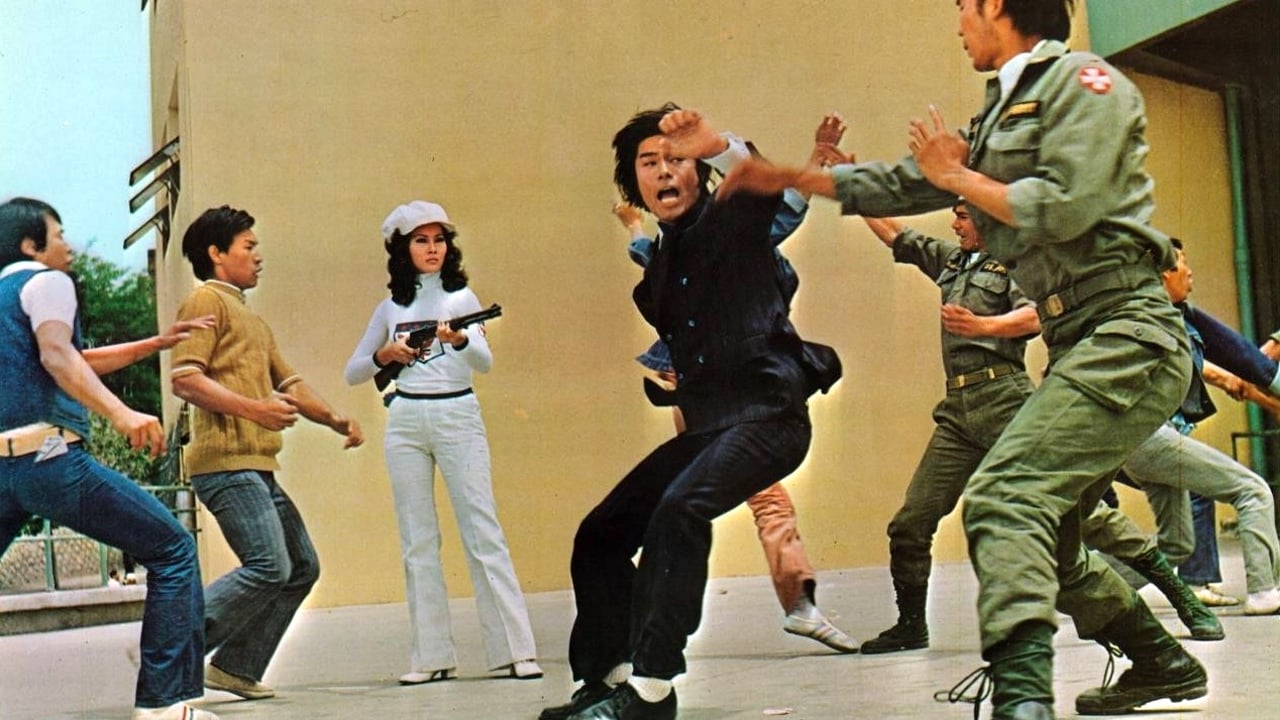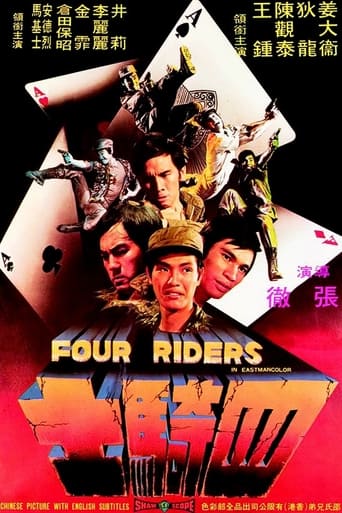

When I see the Shaw Brothers Insignia, I know I will be in for an interesting time. Four Riders features 4 of my fave SB men, one in a cameo. The story begins with Chinese GI, Feng Xia (Ti Lung), who having finished his service in the Army and wanting to kick back in Seoul SK, wanders onto the beating of an American GI who wants to retire from being a drug mule for a local cartel. Feng is severely beaten and left unconscious by the drug gang and framed for the American's death. His buddy, Gao Yin-Han (Wong Chung) is visiting his former Lt., Li Wei-Shi (Chen Kuan-Tai) at the hospital where Feng is brought and placed in the jail ward. Yin-Han knows Feng is innocent and wants to free him before Feng is executed. Jin Yi (David Chiang) sees Feng's picture in the newspaper and vows to find a way to help him as well. A haphazard plot to free Feng involves using Li's Nurse girlfriend, Song Hua (Ching Li), as a hostage. Things go okay until the drug gang arrives and Song is killed in the chaos. This leaves Feng, Li and Yin-Han on the run from MPs and the gang. Jin Yi locates them by going to a place he and Feng often used during their leaves in Seoul. The MPs foolishly believe the wanted men are part of the gang run by American Mr. Hawkes (Andre Marquis) and declare to bring them in, dead or alive. The four men hide out and plot strategy to exact revenge against Mr. Hawkes while trying not to be discovered by MPs. There is a scene involving stolen American Uniforms and check points that makes the MPs look incredibly stupid. The fight scene are good. The gymnasium fight at the end has to be watched while ignoring physics and weapons knowledge. No one of importance survives this movie plot. No one. They four men do their damnedest to make it to the final credits, but, this is a Shaw Brothers film and that doesn't always happen. I gave it a 7 because of the main four characters. I tossed in the extra 1 because Fu Sheng has a cameo in the nightclub.
... View MoreA 1972 Shaw Brothers production by the studio's prolific director Chang Cheh. If you are familiar with Shaw Brothers films, the cast boast the superstars of the era: Ti Lung, David Chiang, Wang Chung and Chen Kuan-tai. To the uninitiated, you have to suspend your disbelief to enjoy a Shaw Brothers film, especially of this genre.The story, which takes place after the end of the Korean War in 1953, tells about a wounded innocent bystander - a Chinese soldier, an expert in hand-to-hand combat (Ti Lung) who is framed for the brutal murder of an American G.I.. Not wanting to be falsely sentenced and possibly hanged, he escapes from the hospital with the help of his three friends who have just retired from the same war: a kungfu instructor (David Chiang) who is also a patron of a brothel run by an American gangster and his Japanese second-in-command Lei Tai (Yasuaki Kurata), an explosives expert (Wang Chung) and a weapon expert (Chen Kuan-tai). Hiding out in a prostitute's house whose brothel the kungfu instructor often frequents, the four plan to find a way to help their accused friend. However, the matter becomes complicated as Lei Tai and his men of the brothel, who are the real murderers of the G.I., and the South Korean Military Police, assigned to arrest the four soldiers dead or alive, are hot on their trail. Knowing that the two opposite sides of the law are closing in, the four cornered fugitives are forced to settle their predicament in a ruthless final confrontation.FOUR RIDERS is not in the same league as Chang Cheh's superb "Seven-Samurai-like" 1975 kungfu film THE SAVAGE FIVE which boasts the same four superstars. Firstly, this is largely due to the inaccuracy of the production design. The story that takes place in 1953 is not portrayed as is. Instead, audience see the South Korea of 1972 when the film was shot. Most probably, this happened due to cost constraint. Another reason is the unrealistic foley (sound effects) that is used during the fights: the often heard "yap" and "whack" sounds in badly dubbed kungfu movies of the 70's. Then there are the technical inaccuracies: the weapon used by one of the main characters, in this case a rifle that can shoot multiple times without reloading or the law-of-physics defying act of flailing a barbell as a killing weapon as though it was weightless!Despite these inaccuracies, FOUR RIDERS manages to entertain and is worth watching for fans of the four actors, especially those who like to see desperate heroes fighting against all odds!
... View MoreFOUR RIDERS (1972) is an odd Shaw Bros. kung fu film set in Seoul in July 1953, just after the end of the Korean War. Director Chang Cheh teams up David Chiang, Ti Lung, and Chen Kuan Tai--who would appear together as the three "Blood Brothers" in Chang's 1973 film of that name--with Wang Chung (POLICE FORCE) to make up a quartet of Chinese soldiers who were fighting on the South Korean side and are now at loose ends in Seoul. When one (Ti) is framed by a drug gang for the murder of an American G.I., all four hide out from both Korean MPs and the drug gang, which is led by an English-speaking westerner named Boss Hawkes (played by Andre Marquis) and his second-in-command played by Japanese actor Yasuaki Kurata, who appeared in many Shaw Bros. and other Hong Kong films.The slim plot doesn't generate much in the way of suspense, excitement or logic for the first 85 minutes, but it almost makes up for it in the last 20 minutes with a nonstop barrage of kung fu battles (expertly staged by Tang Chia and Liu Chia Liang) as three of the four (Ti, Chen, and Wang) take on Kurata and his thugs in a set of pitched battles, first out on the street and then in a spacious gym, where all the gym equipment is put to use in the fighting. Meanwhile, at the bar where all the trouble started, David Chiang singlehandedly takes on Boss Hawkes and his men and then joins his buddies at the gym. Kurata and his moll, played by Tina Chin Fei, are armed with a rifle, complete with ineffectual silencer, and the action eventually includes a fair amount of gunplay that looks ever so slightly forward to the Hong Kong action films (1986-92) of John Woo, who claimed Chang Cheh as his mentor.Korean, Mandarin and English are all spoken in the film. It's never explained how these four Chinese soldiers wound up in Korea or how they know Korean. There don't appear to be any Korean actors in any of the major roles and it's not clear how many of these roles are meant to be Korean. The three major female roles are played by Lily Li, as a bar maid with a yen for David; Ching Li, as a nurse who cares for Chen in the early scenes; and Tina Chin Fei as the bad girl and the one with the best part. None of the women are well served by the plot, however.The actors went to Korea and filmed a lot of the street action there. The rest was shot at the Shaw Bros. studio in Hong Kong. There is absolutely no concession to the historical time period. The cars you see on the streets in Seoul are exactly what you would have seen in 1972, when it was filmed. The fashions on the gang members and their girls are exactly what they would have worn in 1972. (Check out Tina's red hot pants.) The white guys recruited to play American soldiers all have long hair, which never would have been the case in 1953. It all gets a little ridiculous after a while.Chen Kuan Tai reads from a Chinese-language bible in a hospital scene early on and makes a reference to the Four Horsemen of the Apocalypse. Although the blurb on the Celestial DVD case makes a big deal out of this, its relevance to the rest of the film remains a mystery.
... View MoreI remember seeing this as a young kid, twice, actually. 4 deserters from the Taiwanese army run afoul of gangsters in Korea during the war. Fairly bleak stuff, climaxed by a huge fight, and for some reason, they use a winchester in the final battle. Everyone dies. I mean everyone.The fights are of the sloppy, "wai yah!" screaming type, such as found in Duel (Duel of the Iron Fist), "Man of Iron" and the "Boxer From Shantung". I gave it a slightly higher rating, as it seemed like it was well acted- I was 14, so who knows? You can really see why they shifted to the more elaborate fight style of the Shaolin/Hung Gar films when you watch this. Without the elaborately choroegraphy, several of these guys look really sloppy. Nothing to search out, but worth a watch.
... View More